- Home
- Jean Stone
Twice Upon a Wedding Page 12
Twice Upon a Wedding Read online
Page 12
The girl rolled her eyes and said, “Sure thing, Uncle Andrew.”
24
Andrew didn’t recall being as glad to get somewhere as when Elaine finally pulled to a stop at a big Victorian and said, “This is it.” Between the breakneck speed at which Elaine had driven, the fact that he’d been unable to unload his secrets as yet, and Cassie dying to wisecrack from the backseat because he’d told her of his intention to confide in Elaine, Andrew was more than ready for the trip to be over. He already decided that he would do the driving on the way back.
“Come in and meet my father,” Elaine said. “Then you two can take the van and explore the area. Don’t forget the snacks in the cooler in the back.”
He must remember to take some soda from the cooler she’d been so thoughtful to bring. If nothing else, they could give the apples to a horse or two and Elaine would never know. Just as she’d never know if they ditched the plastic, tasteless cheese (“Gross and disgusting” were Cassie’s sentiments, he knew). Surely they’d find a trash container along the road.
Andrew and Cassie followed Elaine onto the front porch. She rang the bell.
“What a great old place,” Andrew said.
“My parents bought it not long after they were married, the first year they had the restaurant. My father often said he’d been afraid they’d never have another good year like the first.”
“He was wrong?” Andrew asked.
“Very.” Her hand rubbed the woodwork. “It looks freshly painted. I am so glad.”
They stood a moment, then Elaine rang again. She checked her watch. “We’re about an hour early,” she said, which was easy to account for since she’d come to get them half an hour before she’d said, and they’d practically hydroplaned across the Mass Pike and the New York State Thruway up to Route 87. “I suppose we can go in the back way. I know where there’s a key.”
Andrew felt a little weird sneaking around the concrete walk to the back of the house, where the same porch had stretched itself around the sides and to more steps that led to another door. That one was solid wood, not decorated like the one in front.
In the yard, next to a garage that had been painted to match the house, was an old-fashioned clothesline and a giant grape arbor. Elaine walked to the arbor, reached up, and produced a key that dangled from a bright green plastic tag.
“Bingo,” she said, then smiled. “Of course, Lily wouldn’t say that. She’d say something like ‘Aha, here we are, then!’ ”
Cassie frowned and said she liked “Bingo” better, and Elaine lead the three of them up the back stairs.
As Elaine began to turn the key, the door opened. If the person on the inside was Elaine’s long-lost father, he looked a little strange wearing a flowered dress and a long-sleeved cardigan, not to mention that his blue-white hair looked recently bouffanted and hair-sprayed to death.
“Elaine?” the person asked.
“Mrs. Tuttle?”
Then a man appeared behind the alleged Mrs. Tuttle.
“Dad?”
“Elaine?”
Andrew resisted an urge to pipe up with his name, too. He decided the drama unfolding was more entertaining.
“Well,” Daddy said.
“Well,” Mrs. Tuttle said.
“Well what?” Elaine’s eyes fell to a clothes basket that Mrs. Tuttle held. All eyes followed accordingly. “Are you helping Dad around the house? How nice.”
Mrs. Tuttle smiled and looked to Elaine’s father.
Slightly stooped, the man hiked up the edges of his flannel shirt and shoved his hands into the pockets of his flannel pants. “She lives here, Elaine,” he said. “She’s been here, what is it, Larry, two or three months now?”
Elaine stood there, still holding out the key with the bright green tag as if she were about to insert it into something, perhaps Mrs. Tuttle’s throat. “Well,” she finally said, “we didn’t mean to interrupt.”
Her father excused himself, stepped past Mrs. Tuttle, and came out onto the porch. “I’ve been meaning to tell you, but we don’t talk too often anymore.” Even Andrew—grown-up, orphan Andrew—knew a zap of guilt when one flew past him.
“Well,” Elaine responded, finally lowering the key. “You’ve been keeping busy, or so it seems.”
“When you called and said you were coming, I knew I’d tell you today. But you’re early. We aren’t ready. Larry was going to go to the market. She planned to come back after you’d been here a while and I’d had the chance to tell you.”
Andrew wished he’d stop calling the woman “Larry.” It was confusing.
“Well,” Elaine said, “it didn’t work out that way.”
“No,” he said, “I’m sorry.” He withdrew his right hand from his pocket and gestured to the woman with the basket. “This is Laurene Tuttle,” he said, then held out his hand to Andrew. “Bob McNulty. The embarrassed father.”
Andrew shook his hand. “Andrew Kennedy,” he said. “And this is Cassie. We’re friends of Elaine’s. We came up to see Saratoga.” He did not add “and to meet you,” because that subject seemed to have been covered. He turned to Elaine. “So we’ll run along, if you’ll give me the car keys.” There was a bit of back and forth while Elaine mistakenly handed Andrew the back-door house key, then corrected herself. Andrew and Cassie said good-bye, that they’d be back later, and made it down the stairs as Bob McNulty said, “Well, come inside, Elaine. It’s chilly out here.”
“Chilly” wasn’t the word for it.
And though he felt a little guilty at leaving Elaine behind, Andrew quickly guided Cassie back to the minivan, where they jumped inside, looked at each other, and Cassie asked, “Geez, Dad, what the heck was that about?”
25
It was agonizing. As soon as Elaine stepped inside the back hall she knew that this was one of those forever moments that gets locked up in your heart and hurts too much to let it out.
Mrs. Tuttle was everywhere.
A pair of gardening boots was parked beneath the coatrack. Next to them were an umbrella with pink and yellow flowers and a frayed straw hat that Elaine’s mother never would have worn.
“Coffee?” Mrs. Tuttle asked. “Your father’s Crab Creole won’t be ready for a while.”
Elaine said okay and sat down at the boothlike kitchen table—our “dinette,” her mother used to call it. She waited for the numbness to wear off. This did not feel like the right atmosphere in which to rebuild the family.
Her father sat across from her. Mrs. Tuttle went behind the counter where Elaine’s mother should have been in her shirtwaist and loafers.
“So,” Bob McNulty said, “this is some surprise.”
He could say that again.
“I worried when I first heard your voice. Is something wrong? Are the kids okay?”
Elaine realized that the “surprise” to which her father referred was her phone call to him, not that Mrs. Tuttle was now sleeping in his bed.
“Nothing’s wrong, Dad. The kids are fine.” Her voice was clear and unwavering, as if she were not at all in shock. She tried to take a deep breath. She tried to smile. She tried to act as if this was no big goddamn deal. “Remember Lily, Dad? And Sarah and Jo, my old college roommates?”
He laughed. Time had not changed the wondrous chortle of his laugh, a chortle that was honest and sincere, as if he always got the joke. “You girls were something. And that Lily. How many times is she married now?”
“Three times. But her last husband died.”
“Too bad,” he said.
Mrs. Tuttle put a plate of shortbread biscuits on the table. It was an unfamiliar plate with a gold scalloped rim, not a white plate with green ivy like the ones that belonged here, in her mother’s kitchen.
“We have a shop now, all of the roommates,” she continued. “We’re planning second weddings. It’s a big business these days.” She blinked at the irony. She wondered if her father would surprise her with that next: “Mrs. Tuttle’s my wife now. Isn’t
that great?”
Instead he said, “Do you need money?”
It was not the first time he’d asked if Elaine needed money. He’d asked in different ways, but the offer had been there.
When he learned she’d gotten married: You need money, I suppose.
Then when she was divorced: You’ll be needing money now.
She hadn’t accepted any, ever. It just hadn’t seemed right.
“No money,” Elaine said now, picking up a biscuit to be polite. “A little moral support would be great. And maybe a few ideas for receptions. And some old recipes.”
“Recipes? What? You’re going to give brides a recipe collection?”
She bit into the biscuit, expecting it to be tasteless and dry, disheartened that it was good.
Mrs. Tuttle set two mugs of coffee on the table and abruptly said she’d be off to do her errands. She asked if there was anything Bob or Elaine might need. Both of them shook their heads.
When the back door was closed behind her, Elaine’s father said, “She’s a good woman, Elaine. She helps fill up the lonely days and nights. We’re going on a cruise this winter. I always wanted to go on a cruise. Your mother was afraid of the water.”
Elaine nodded. It was the closest thing she could come to approval.
“Anyway, Dad,” she tried to continue, “if you still have anything—especially your recipes—would you be willing to let us have them?”
“Who’s doing the cooking?”
“We’ll look for a caterer.”
Bob scratched his chin. Elaine realized that the gray-white stubble that she’d seen in recent years now was shaved clean. Perhaps for Mrs. Tuttle. Then he chuckled. “I was going to give my old restaurant scrapbooks to the museum. But if you girls could use them . . . oh! Remember the Ashton wedding that they canceled only an hour before the guests were to arrive? We ate prime rib for months.”
Elaine smiled. She remembered.
“And the time we had Dover sole flown over from the Bering Sea . . . it had to be from the Bering Sea, as if the guests would know . . . and how about the Blakely wedding? It was so hoity-toity.”
“Caroline Blakely,” Elaine said.
“It was her first wedding. She had half a dozen more. Ha! She could dance wedding rings around your friend Lily.”
Elaine smiled. “What do you think, Dad?”
Slowly he nodded. “The recipes? Sure. You can have them. They’re upstairs in the attic. You want me to go with you?”
She said “No, thanks,” that she’d be fine. Then she left the table, her coffee untouched.
Mrs. Tuttle had lived three streets over and had been married to Mr. Tuttle, head of the Department of Streets and Engineering when Elaine was growing up. They lived in a house not unlike the McNultys’, and had twin sons in the third grade when Elaine was in the eighth. They were good customers at the restaurant, and often called to place orders for Filo Mushroom Pies, which Elaine delivered because Bob believed in going out of your way for good customers.
Elaine climbed to the second floor, bypassed the bedrooms without looking in, then took the narrow stairs up to the next level.
It was dimly lit, dusty, a typical attic. She glanced around quickly, pleased that all the boxes and storage cabinets seemed as she remembered . . . that no new ones had been added by the other woman.
Elaine suddenly wondered what the twins—Dennis and Danny—thought about Bob McNulty and their mother’s new life. Sons accepted those things far more easily than daughters, didn’t they?
With a deep sigh, Elaine decided she’d worry about all that later.
She popped the lid on a cedar chest—Elaine’s mother’s “hope chest,” she remembered they had called it—the place where young women put linens and china and kept them until the day they were married, or “hoped” they were married. A pungent scent of cedar exhaled from inside.
She coughed. She pulled out one afghan, then another, and a third, dragged them in front of a pile of sealed boxes and made a comfortable nest. She sat down on the top afghan: It had been her favorite.
Lily would have died if she saw the multicolored yarn in browns and rust and harvest gold. But though the colors were garish, the blanket reminded Elaine of one snowy winter when the yarns spilled down her mother’s lap, the click-click of the knitting needles keeping time with the crack-crack of the fire, all synced with the melodies from the grand piano that her father created across the big room. Elaine remembered sitting and reading, as if they were a family of a century ago, before television and radio and the Internet. They’d been a family as tightly knit as the brown and rust and gold afghan.
It was, of course, her fault that they’d drifted apart. She should have tried harder, especially after her mother died. But she had been brokenhearted—she’d loved her mother so much. Still, if Elaine had tried harder, maybe her father would not have needed Mrs. Tuttle.
She dug through the cedar chest; she lingered over photo albums with pictures of her mother—young, happy, absurdly in love with her father; and of her father—robust, smiling, Mr. Personality of Saratoga Springs.
There were also photos of people Elaine didn’t know: rich people, horse people, dressed in their finery (fashions and hairstyles and heavy black eyeliner on the ladies that Lily would have laughed at), posed at “their” table in the restaurant, as if they were important, which they had been, at least to Bob McNulty, whose livelihood depended on them having a good day at the track.
Elaine pored through box after box, sorting the pictures of her parents away from the rest.
And then she found the recipes.
“Oh,” Elaine cried when she opened a metal storage chest that had been tucked under a dormer behind a few thousand cobwebs and an old dress form. “Oh.”
The recipes were in neat binders, the way Elaine’s mother had carefully organized them late at night, hand-printing the labels, the way Bob had liked. Appetizers, Soups, Salads, Entrées. And Bob’s special favorites, Decadent Desserts.
“Women love desserts,” he always maintained. “Give a man a good brandy, give a lady a dessert.”
And because he felt women often were the ones who selected the restaurant, Bob made sure they had plenty of sweets.
She thumbed through yellowed pages.
Velvet Mousse.
Crème Fraîche.
A White Chocolate Lace Bridal Veil. She stopped. She remembered he had made the first one for Caroline Blakely’s wedding. She thought it was the most beautiful creation that she had ever seen.
And then, Tiramisu à la Saratoga (layers of custard on raspberry sauce, made from the finest New York State wild raspberries, picked by, of course, Elaine).
“Why are New York wild raspberries better than others?” Elaine had once asked her father, but he’d simply winked and hadn’t offered any answer.
One by one the memories collected in little puddles in her eyes. Then quietly they overflowed and ran down to her chin.
They were exhausted. Andrew and Cassie had hoofed around the racecourse, not once, but twice, examined the back track and the paddocks and the cooling-down fields. Then they’d visited the museum—the National Museum of Racing and Hall of Fame—followed by a drive to the Saratoga Performing Arts Center where they saw an awesome sunset reflected in the mineral baths between the huge cathedral pines. They even ate some of the string cheese and drank the root beer because they didn’t want to waste time having lunch.
As always, Andrew had the most fun when he was with his daughter. Just hearing her laughter, watching her delight at experiencing new things, made his heart ache with love and his problems seem nil.
It wasn’t until they went back to pick up Elaine that Andrew thought about what he would say.
I am not gay.
I am not a receptionist.
I am Cassie’s father.
He was glad Cassie was there. If things became too tense, she would make them laugh.
In the Stop ’n’ Shop on the outskirts
of West Hope, Jo reasoned that no matter how good Andrew’s intentions were, the fact was he would glean less insight into John Benson’s character from reading a magazine than Jo could if she’d read his palm.
She dropped another copy of the latest issue of Buzz into the half-filled supermarket cart. Some things, she thought, need to be left to the professionals. Twenty years in public relations certainly qualified her for that title.
Then she headed for the checkout, determined not to dwell on the fact that it was Saturday, and that, unlike last week, she didn’t have a date.
“Your friends are here.”
Elaine stirred at the sound of the familiar—yet unfamiliar—voice. She opened her eyes. “Dad?”
He crossed the floor toward her.
She blinked and looked around. The attic. She looked down. She had curled up on her mother’s afghan and fallen asleep.
He squatted by her side. In the dim light he looked softer than he had last Easter, less wrinkled, if that were possible. His gray eyes looked brighter, more at peace. “Did you find what you wanted?”
Nodding, she sat up. She smoothed the afghan, straightened the fringe.
“Would you like to take the blanket?” her father asked. “There’s a whole stack of her things in your bedroom, too. I was hoping some day you’d want them.” He said your bedroom as if Elaine still lived there, as if it hadn’t been more than two decades since she’d moved away.
She knew it wasn’t realistic to think that if her mother’s things stayed there life wouldn’t have to change, the house would remain “Bob and Alice McNulty’s,” and not become “Bob and Larry’s place.”
She knew it wasn’t realistic, but her father’s recipes were one thing, her mother’s belongings—things her mother had touched, jewelry she’d worn, trinkets she’d cherished—were quite another. Those would stay in Saratoga, where they belonged.
Elaine rubbed a spot of hurt that had formed over her heart. Then she folded the afghan and replaced it in the hope chest. “Maybe another time,” she said.

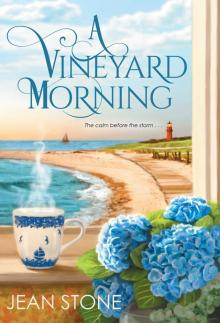 A Vineyard Morning
A Vineyard Morning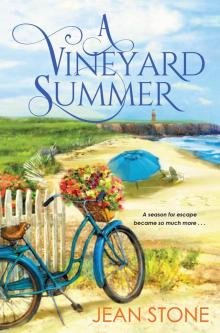 A Vineyard Summer
A Vineyard Summer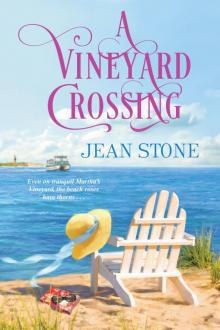 A Vineyard Crossing
A Vineyard Crossing A Vineyard Christmas
A Vineyard Christmas Beach Roses
Beach Roses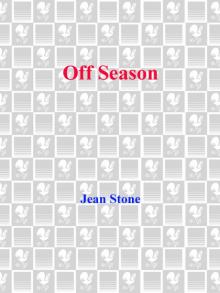 Off Season
Off Season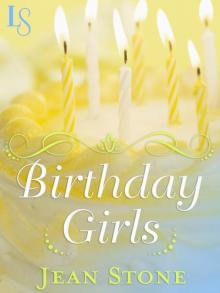 Birthday Girls
Birthday Girls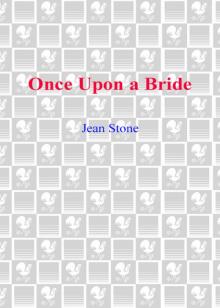 Once Upon a Bride
Once Upon a Bride Places by the Sea
Places by the Sea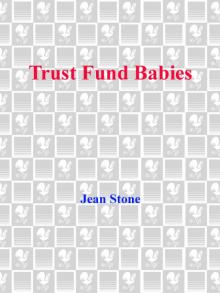 Trust Fund Babies
Trust Fund Babies The Summer House
The Summer House Tides of the Heart
Tides of the Heart Sins of Innocence
Sins of Innocence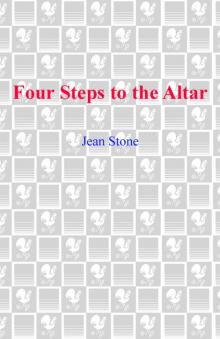 Four Steps to the Altar
Four Steps to the Altar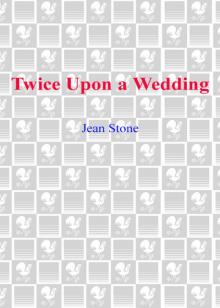 Twice Upon a Wedding
Twice Upon a Wedding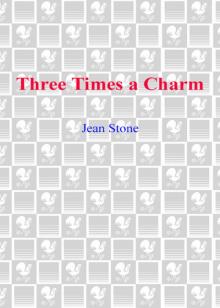 Three Times a Charm
Three Times a Charm